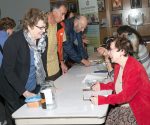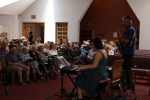The Oct. 29 Jewish Seniors Alliance Fall Symposium on Preparing for End-of-life Transitions drew 160 participants to the Peretz Centre for Secular Jewish Culture. (photo by Alan Katowitz)
The Oct. 29 Jewish Seniors Alliance Fall Symposium on Preparing for End-of-life Transitions drew 160 participants to the Peretz Centre for Secular Jewish Culture. Several aspects of the topic were discussed, with Dr. Sue Hughson speaking on the importance of advance care planning, and Rabbi Philip Bregman presenting some of the Jewish perspectives to be considered.
JSA president Ken Levitt opened the afternoon, welcoming attendees and encouraging them all to become supporters or members of JSA, if they weren’t already. He then introduced Gyda Chud, JSA vice-president, who moderated the symposium, and introduced each speaker.
Hughson has been practising veterinary medicine since 1990. She has been involved in social activism in various forms over the years and currently serves as past president of the British Columbia Humanist Association. Along with her duties on the national board of Dying with Dignity Canada, she is co-chair of the DWDC Vancouver chapter. One of DWDC’s stated purposes is to “educate Canadians about all of their legal end-of-life options, including the constitutional right to medical assistance in dying … and the importance of advance care planning.”
Hughson began by pointing out that talking about dying won’t kill you and that supporting end-of-life choices is pro-choice not pro-death. She outlined the various documents that should be completed in order to plan, in advance, for orderly outcomes. Some of the documents that need to be completed are an advance directive; a representation agreement; and an enduring power of attorney. These documents should be easily accessible – keep them in the freezer, for example. If they are in a safety deposit box, they will not be easily accessed. She also suggested bringing them to the hospital so that the staff is aware of your wishes. These issues should be discussed well in advance with family and close friends so that everyone involved is cognizant of the planning.
In British Columbia, said Hughson, we have the right to a second opinion, the right to refuse treatment, the right to end our own life and the right to assisted death (if a person qualifies).
There are a number of organizations that can help expedite the planning. One is Nidus, another is Dying with Dignity. They have a lot of information on their websites and are also accessible by telephone. Other helpful aids are estate lawyers and financial planners.
One point about the representation agreement, she pointed out, is that there are two forms: No. 9 is the form for capable adults and No. 7 is for those unable to complete it on their own. In this type of agreement, you are outlining your choices, so that, should you become incapable, those acting on your behalf can carry out your wishes. You can register your documents with Nidus. It is interesting to note that eight out of 10 doctors have done advance care planning because they see the importance of doing so.
Bregman was senior rabbi at Temple Sholom from 1980 to 2013. He has been Jewish chaplain at the University of British Columbia since 2013 and serves as executive director of Hillel BC. He explained the importance in Judaism of having an ethical will, where you record the beliefs and ideas that you want to pass on to future generations. This has been a practice in Judaism for thousands of years, he said.
An ethical will can be written on paper or take the form of a video. Bregman emphasized how important it is to have the discussion about end-of-life with your family: what you want to happen regarding funeral arrangements, burial, etc. If the dying person avoids the issues because they think their family is afraid to discuss them, the dying person may feel isolated.
Bregman explained that the Vidui is said at the deathbed if the dying person is unable to say it themselves. It is a prayer asking God for forgiveness. He stated that people usually die at night or early morning, and he thinks it may be because they wish to be alone. But he has experienced what he called the awesome feeling of being present at the moment of death and being aware of the soul leaving the body. The tradition of naming children after a departed relative stems from the idea of the continuation of the neshamah (soul) in a new being, he explained.
The rabbi emphasized the importance of organ donation as helping with life. It is not against Jewish tradition, he said, and is accepted even by the Orthodox. He said people should talk with the Chevra Kadisha (Burial Society) to learn more about the traditions surrounding the preparation of the body for burial. For example, in order to be kosher, the coffin must be biodegradable. There must also be holes in the coffin for a quicker return to nature. We are, after all, only burying the vessel, the neshamah has already departed.
To a question about cremation, Bregman replied that, in Judaism, nothing should be done that is disrespectful to the body and burning is considered disrespectful by most rabbinical authorities. Regarding leaving your body to science or a postmortem, he said it is important to specify that the body be returned for Jewish burial, otherwise it will be cremated. Finally, he stated how important it is to make funeral arrangements in advance, how helpful that is for the family and, again, he encouraged everyone to become an organ donor and help save a life.
Chud then thanked the speakers and invited everyone to partake of the refreshments. A video of the entire event, as well as the PowerPoint by Jack Micner, an estate lawyer who was unable to speak at the symposium due to unforeseen circumstances, will be available on the Jewish Seniors Alliance website.
Shanie Levin, MSW, worked for many years in the field of child welfare. During that time, she was active in the union. As well, she participated in amateur dramatics. She has served on the board of the Jewish Federation of Greater Vancouver and is presently on the executive of Jewish Seniors Alliance and a member of the editorial committee.






